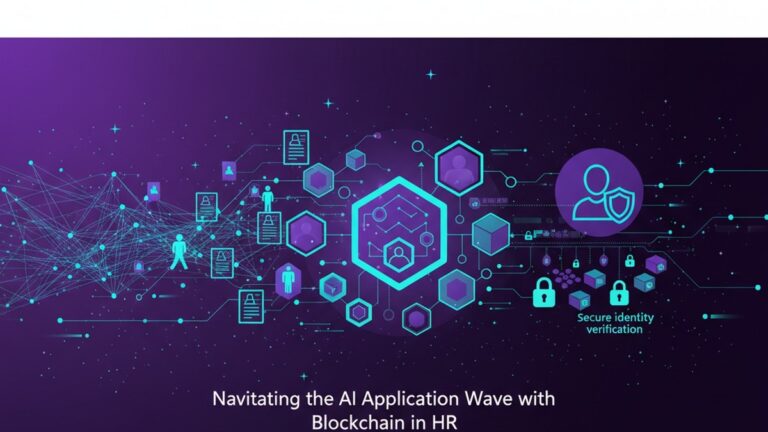As businesses grapple with an ever-increasing tide of AI-generated job applications, blockchain technology emerges as a potential savior in the human resources (HR) arena. In today’s digital age, where AI can craft remarkably polished applications, the challenge lies in distinguishing genuine talent from mere algorithmic prowess. Blockchain-based identity solutions are stepping up as a viable way to ensure that candidates possess the skills they claim.
The AI Application Deluge
Over the past few years, the use of AI tools in crafting job applications has exploded. These tools can generate cover letters and resumes that are not only well-written but also tailored to specific job descriptions. While this might seem like a boon for job seekers, HR departments face a dilemma. How do they sift through heaps of applications to find those who genuinely match the job requirements?
AI-generated applications often come with a veneer of sophistication, creating an illusion of a perfect candidate. However, these applications can lack the depth and authenticity needed to succeed in the workplace. This is where blockchain technology can make a significant impact.
Blockchain’s Role in Verifying Skills
Imagine a world where a hiring manager can instantly verify a candidate’s credentials and skills with just a few clicks. Blockchain technology, with its decentralized and immutable nature, offers a solution that is both efficient and reliable. By storing educational qualifications, work experience, and even skill certifications on a blockchain, employers can quickly verify the authenticity of a candidate’s claims.
For example, when a candidate states they are proficient in a particular programming language, a blockchain-based certificate from a recognized institution can serve as verifiable proof. This not only reduces the time spent on background checks but also ensures that the skills listed on a resume are genuine.
The Benefits of Blockchain-Based Identity
The adoption of blockchain in HR could bring about several advantages. First and foremost, it would significantly reduce instances of fraud and misrepresentation. Candidates wouldn’t be able to claim credentials they don’t possess, as each piece of information would be independently verifiable against the blockchain.
Moreover, this technology can streamline the hiring process. With automated verification, HR professionals can focus on assessing a candidate’s fit for the company culture and their potential for growth, rather than spending countless hours validating credentials.
Additionally, blockchain-based identity solutions offer enhanced privacy for candidates. Unlike traditional methods, which may require sharing personal information with multiple parties, blockchain allows for selective sharing. Candidates can choose to share only the information necessary for a particular job application, protecting their privacy and reducing the risk of data breaches.
Challenges and Considerations
Despite its potential, the integration of blockchain into HR practices isn’t without its challenges. One significant hurdle is the need for widespread adoption. For blockchain-based credentials to be effective, educational institutions, certification bodies, and employers need to buy into the system. This requires a shift in mindset and investment in new technologies, which can be a barrier for some organizations.
Furthermore, there’s the issue of standardization. With multiple blockchain platforms available, establishing a universal standard for credential verification is crucial. Without this, the system could become fragmented, diminishing its effectiveness.
Cost is another factor to consider. Implementing blockchain solutions can be expensive, and smaller companies might find it challenging to justify the investment. However, as the technology matures and becomes more accessible, these costs are expected to decrease.
A Balanced Approach to Hiring
As we move forward, a balanced approach that leverages both AI and blockchain might be the key to efficient and effective hiring processes. AI can still play a role in screening applications and identifying potential candidates based on certain criteria. However, blockchain can ensure that the shortlisted candidates truly have the skills and experience they claim.
By embracing these technologies, companies can not only improve their hiring processes but also enhance their workforce’s overall quality. It’s about finding the right balance and using technology to complement human judgment rather than replace it.
In conclusion, as the digital landscape continues to evolve, so too must the methods we use to navigate it. Blockchain-based identity verification offers a promising path forward, allowing HR professionals to cut through the noise and focus on what truly matters: finding the best talent for the job. While challenges remain, the potential benefits make it an avenue worth exploring for any organization serious about staying ahead in the competitive world of talent acquisition.

Steve Gregory is a lawyer in the United States who specializes in licensing for cryptocurrency companies and products. Steve began his career as an attorney in 2015 but made the switch to working in cryptocurrency full time shortly after joining the original team at Gemini Trust Company, an early cryptocurrency exchange based in New York City. Steve then joined CEX.io and was able to launch their regulated US-based cryptocurrency. Steve then went on to become the CEO at currency.com when he ran for four years and was able to lead currency.com to being fully acquired in 2025.


